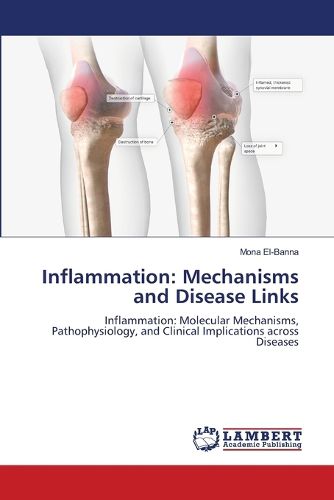Readings Newsletter
Become a Readings Member to make your shopping experience even easier.
Sign in or sign up for free!
You’re not far away from qualifying for FREE standard shipping within Australia
You’ve qualified for FREE standard shipping within Australia
The cart is loading…






Inflammation is a coordinated biological response to pathogens, tissue damage, or environmental stressors, involving immune and non-immune cells, signaling pathways, and soluble mediators to restore homeostasis. Acute inflammation is protective, marked by rapid innate immune activation, leukocyte recruitment, and cytokine release (TNF-?, IL-1?, IL-6), with NF-?B, MAPK, and JAK/STAT pathways driving gene transcription. Resolution occurs via pro-resolving lipid mediators, anti-inflammatory cytokines, and clearance of apoptotic cells. Dysregulation leads to chronic inflammation, driving autoimmune diseases, cardiovascular disorders, metabolic syndromes, cancers, and neurodegeneration. In CVD, vascular inflammation induces endothelial dysfunction and atherosclerosis; in metabolic disease, low-grade inflammation promotes insulin resistance and NAFLD; in cancer, it fosters genomic instability and immune evasion. Neuroinflammation, mediated by microglia and astrocytes, contributes to Alzheimer's, Parkinson's, and multiple sclerosis. Understanding these mechanisms enables targeted therapies that suppress pathological inflammation while preserving protective functions.
$9.00 standard shipping within Australia
FREE standard shipping within Australia for orders over $100.00
Express & International shipping calculated at checkout
Stock availability can be subject to change without notice. We recommend calling the shop or contacting our online team to check availability of low stock items. Please see our Shopping Online page for more details.
Inflammation is a coordinated biological response to pathogens, tissue damage, or environmental stressors, involving immune and non-immune cells, signaling pathways, and soluble mediators to restore homeostasis. Acute inflammation is protective, marked by rapid innate immune activation, leukocyte recruitment, and cytokine release (TNF-?, IL-1?, IL-6), with NF-?B, MAPK, and JAK/STAT pathways driving gene transcription. Resolution occurs via pro-resolving lipid mediators, anti-inflammatory cytokines, and clearance of apoptotic cells. Dysregulation leads to chronic inflammation, driving autoimmune diseases, cardiovascular disorders, metabolic syndromes, cancers, and neurodegeneration. In CVD, vascular inflammation induces endothelial dysfunction and atherosclerosis; in metabolic disease, low-grade inflammation promotes insulin resistance and NAFLD; in cancer, it fosters genomic instability and immune evasion. Neuroinflammation, mediated by microglia and astrocytes, contributes to Alzheimer's, Parkinson's, and multiple sclerosis. Understanding these mechanisms enables targeted therapies that suppress pathological inflammation while preserving protective functions.